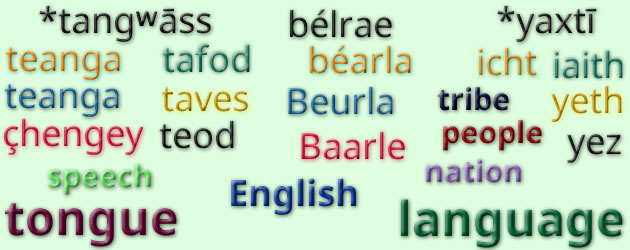Today we’re looking at the words for language and tongue and related things in Celtic languages.

| Proto-Celtic | *tangʷāss, tangʷāt = tongue |
|---|---|
| Old Irish (Goídelc) | tengae [ˈtʲeŋɡe] = tongue, language |
| Irish (Gaeilge) | teanga [ˈtʲaŋə / ˈtʲaŋɡə] = tongue, language teangach = tongued, lingual, wordy, loquacious teangachruthach = tongue-shaped, linguiform teangaigh = to tongue (in music) teangaire = interpreter teangeolaí = linguist, expert in linguistics teangeolaíocht = linguistics |
| Scottish Gaelic (Gàidhlig) | teanga [tʲɛŋgə] = tongue, speech, spit (of land) teangan = tongue teangaidh = tongue, speech teangach = abounding in tongues, loquacious, langued (in hearldry) teangair = linguist, interpreter, orator, philologist |
| Manx (Gaelg) | çhengey [ˈtʃɛnʲə] = bell-clapper, clasp, feather, strap-hinge; catch (of buckle); tongue; language, speech; utterance çhengeyr çhyndaader = interpreter çhengeyder = linguist çhengoaylleeaght = linguistics çhengey ny mayrey = mother tongue daa-hengagh = bilingual yl-çhengagh = polyglot |
| Proto-Brytonic | *tau̯āt, *tavọd = tongue |
| Old Welsh | tauawt = tongue, language |
| Middle Welsh (Kymraec) | tauaut = tongue, language |
| Welsh (Cymraeg) | tafod [ˈtavɔd / ˈtaːvɔd] = tongue, faculty of speech, power of expression; language, speech, dialect, accent tafod aur = pleasant or witty talk, eloquence (“gold tongue”) tafod bach = uvula tafod cloch = clapper (of bell) tafodiaeth = language, vernacular or native language, dialect, pronunciation, articulation, verbal expression tafodi = to scold, rebuke, chide, berate, cheek, abuse (verbally), tongue (in music) tafodiad = a scolding or berating, pronunciation tafodwr = speaker, talker |
| Old Cornish | tauot = language, tongue |
| Middle Cornish | tawes = language, tongue |
| Cornish (Kernewek) | taves = language, tongue tavosa = to scold, tell off tavosek = talkative, verbose tavoseth = idiom, jargon |
| Old Breton | tavod = tongue |
| Middle Breton | teaut, teut = tongue |
| Breton (Brezhoneg) | teod [ˈtɛwt] = tongue teodel = oral teodek = talkative, gossipy teodyezh = speech, dialect, way of speaking teodyezhañ = to speak teodyezher = speaker |
Etymology: from the Proto-Indo-European *dn̥ǵʰwéh₂s (tongue) [source].
Words from the same PIE root include: tongue and language in English, lingua (tongue, language) in Italian, язик [jɐˈzɪk] (tongue) in Ukrainian, and jazyk (tongue, language) in Czech and Slovak [source].
| Proto-Celtic | *yaxtī = language |
|---|---|
| Middle Irish (Gaoidhealg) | icht = race, people, tribe; province, district |
| Proto-Brythonic | *jeiθ, *i̯ekti = tongue |
| Middle Welsh (Kymraec) | ieith, yeith = language, nation, race |
| Welsh (Cymraeg) | iaith [jai̯θ] = language, tongue; people, nation, race, tribe ieithiadur = grammar ieithio = to pronounce, proclaim, express ieithog = having language or several languages, multilingual, polyglot ieithydd = one who has thorough knowledge or command of a language or languages, linguist, grammarian, philologist, interpreter, speark, poet ieithyddiaeth = linguistics, philology, grammar ieithgi = one who is interested in the study of language (rather than of literature), philologist |
| Cornish (Kernewek) | yeth [eːθ / jeːθ] = tongue, language yeth le-usys = minority language yethador = grammar yethel = linguistic yethonieth = linguistics yethor, yethores = linguist |
| Middle Breton | yez = language |
| Breton (Brezhoneg) | yezh [ˈjeːs] = language yezhadur = grammar yezhadurel = grammatical yezhel = linguistic yezher = speaker unyezher = unilingual divyezher = bilingual liesyezher = polyglot |
Etymology: from the Proto-Indo-European *yek- (to utter). It is uncertain if the Middle Irish word icht is cognate with the Brythonic words [source].
Words from the same PIE root include: joke and Yule in English, jul (Yule, Christmas) in Danish and Norwegian, juego (play, game, sport) in Spanish, and joc (game, play, dance) in Romanian [source].
| Old Irish (Goídelc) | bélrae [ˈbʲeːl͈re] = language, speech bélrae Féne = legal language bélrae na filed = acrane vocabulary, poetic language |
|---|---|
| Middle Irish (Gaoidhealg) | bérla(e) = speech, language |
| Irish (Gaeilge) | béarla = speech (archaic) béarlachas = Anglicism béarlagair = jargon béarlamhail = having command of language, fluent (archaic) Béarla [ˈbʲeːɾˠl̪ˠə] = English (language) Béarlóir = English speaker Béarlóireacht = (act of) speaking English |
| Scottish Gaelic (Gàidhlig) | Beurla [bjɤːr̪ˠl̪ˠə] = English (language) Beurlachas = Anglicism Beurla Leathann = Broad Scots |
| Manx (Gaelg) | Baarle [bɛːᵈl] = English (language) Baarlagh = of or pertaining to the English language Baarlaghys = Anglicism Baarleyr = English-speaker, anglophone Baarle Albinagh = Scots, Lallans Baarle Ghaelagh, Baarle Vanninagh = Anglo-Manx (language) Baarle Heenagh = pidgin Baarle chiart = the Queen’s English |
Etymology: from the Old Irish bél (mouth) and -ra (collective suffix) [source].
Words marked with a * are reconstructions.
Sources: Wiktionary, Am Faclair Beag, Online Manx Dictionary, Teanglann.ie, eDIL – Electronic Dictionary of the Irish Language, In Dúil Bélrai English – Old Irish glossary, Geiriadur Prifysgol Cymru, Gerlyver Kernewek, Gerlyvyr Cernewec, Dictionaire Favereau, TermOfis, Le dictionnaire diachronique du breton, Geriafurch, English – ProtoCeltic WordList (PDF), Etymological Dictionary Of Proto Celtic
